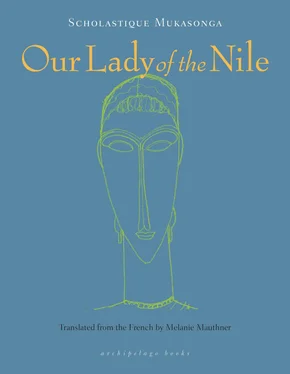A few days later, Mother Superior gathered all the pupils and teachers in the large study room. She appeared quite moved as she stepped onto the stage. She cast an unusually maternal gaze over the pupils: “My girls,” she declared, “we are about to experience a momentous event, a historic event, I’m not afraid to say. Our lycée, the lycée of Our Lady of the Nile, will have the remarkable honor of welcoming the Queen of the Belgians, Queen Fabiola. For King Baudouin and his wife are making an official visit to Rwanda. While the President and the King discuss politics and development, the Queen will visit the First Lady’s Orphanage in Kigali, but she is also keen to recognize and encourage the Rwandan government’s female advancement policy, of which our lycée is the best example. You are familiar with the generosity and piety of Queen Fabiola. She will therefore visit our lycée. We must extend a welcome that will show her the image of today’s Rwanda: a peaceful, Christian Rwanda. She will be accompanied by the Minister of Female Advancement, perhaps Madame the First Lady, too, we don’t know yet. She’ll stay for a day, perhaps, or a half day, I have yet to receive the definitive schedule. In any case, we have a month to prepare for this extraordinary event. The lesson load will be lightened if necessary. I am counting on all you girls, and on you, the teachers, to contribute wholeheartedly to the success of this day, which shall remain forever engraved in our memories.”
The joyful commotion that swept over the lycée during preparations for the royal visit delighted all the pupils. It was a constant whirl of comings and goings, yelling and hubbub, the bustle of the lycée hands as they repainted the corridors, classrooms, refectory, and chapel. The desks were removed from the large study room, and the walls were lined with wraparound fabric bearing images of the President and the King of the Belgians. Classes would be brusquely interrupted when Father Auxile came to get the choristers for a rehearsal, and then the Kinyarwanda teacher would dash in to choose the dancers. Nearly every day, a delegation would arrive from the capital to give instructions, ensure that preparations were advancing properly, and decide on security measures. The Education Minister dispatched his Principal Private Secretary; the Archbishop, one of his Vicar Generals; and the Belgian Ambassador, his First Attaché. The President’s Head of Protocol came in person and held long discussions with Mother Superior and the mayor, who never left the lycée during this time but rushed breathlessly along the corridors and up and down the stairs from one visitor to another, mopping his brow, in an attempt to outdo Mother Superior and her protocols. The pupils would rush to the windows whenever an unannounced Land Rover or military vehicle pulled up, and as the passengers climbed out of the official cars, there was always one girl who recognized a brother, an uncle, a cousin, a neighbor, or a friend. Without waiting for permission, and ignoring the teacher’s feeble threats, they’d leave class to go greet him.
The lycée was a hive of unusual activity. To showcase the progress of female emancipation, and despite Mother Superior’s reticence, it was decided to shorten the skirts of the girls’ uniforms, on the orders of the Minister of Female Advancement. And the same minister sent a consignment of white shirts to replace the old yellow ones. They were practically transparent, which Father Herménégilde seemed to appreciate, despite the reticence he displayed before Mother Superior. A whole afternoon was devoted to fittings and to patches on the bolero jackets bearing the colors of Rwanda and Belgium — Belgian colors on the right, Rwandan on the left over the heart. The tenth-grade girls plaited basketwork pieces as gifts for the Queen; on them they embroidered in red and black fibers: LONG LIVE THE QUEEN, LONG LIVE THE PRESIDENT, LONG LIVE BELGIAN-RWANDAN FRIENDSHIP. The songs composed by Brother Auxile were censored by the mayor, and particularly Gloriosa, the watchful eye of the Party. She considered heavy praise of kings and queens unbefitting to a Republic, in a country only recently freed from the tyranny of the Bami and the entire aristocracy. It was suggested to the composer that he might celebrate the farmer’s hoe and the peaceful development of the country, which had been returned to the common people thanks to the wisdom of its President — and with the assistance of Belgium, of course, and, if he insisted, the manifest protection of Imana and the Blessed Virgin. Brother Auxile did his very best, but the girls refused point-blank to learn “La Brabançonne,” which he suggested they sing after the Rwandan song.
The population of Nyaminombe was mustered to welcome the Queen. Obviously, she wouldn’t have time to visit the town itself, located three kilometers from the lycée, but all the inhabitants would form a guard of honor at the roadside waving little Rwandan and Belgian flags that had yet to be delivered. The crowd would cheer on the procession with shouts of “Hurrah, Fabiola! Hurrah, the President!” The word “queen,” umwamikazi , had been forbidden, for fear it might provoke some outdated nostalgia among some of the people. The imiganda , community workers, devoted themselves to filling in the ruts in the track. Eucalyptus branches were planted on either side of the track, since banana trees, which usually decorate the verges of roads along which official processions pass, struggle to grow at this altitude. A squad of soldiers set up camp close to the lycée and made numerous patrols. It was hoped that the Queen wouldn’t express the wish to visit the source of the Nile (which wasn’t on the schedule, in any case) for there was neither the time nor the resources to restore the damage inflicted on the statue by the bad weather.
Godelive’s mysterious behavior continued. She followed the preparations for the visit with a knowing look, getting involved as little as possible and not answering any questions. Which irritated her classmates greatly. Keenly aware of the arrival of any vehicle at the lycée, she would leap up at every slammed car door. It was noticed that she’d packed all her belongings in her suitcase as if readying herself to leave. A week before the big day, Godelive was summoned to Mother Superior’s office. The whole twelfth-grade class waited for her outside and then walked her back to her “room.” She sat down on her bed, and after a long silence, seeing that her classmates weren’t going to leave her alone, she finally spoke:
“Listen, I want to say farewell, I’m leaving, probably for a long time.”
“Where are you going?”
“Belgium. I’m leaving with the Queen.”
A stunned murmur spread among her audience.
“You’re leaving with the Queen?”
“It’s a secret. I’m going to tell you, but you’re not to repeat a word. To anyone. Especially not the other classes. Swear it.”
They promised her with utmost solemnity to remain silent.
“You know that Baudouin and Fabiola don’t have children. They can’t have any. I don’t know if it’s his or her fault. It’s sad not to have kids, even more so for a king and queen. They’re desperate. So the President thought that since they were coming to Rwanda, at his invitation, the most beautiful gift to offer them would be the gift of a child. You know very well it’s the done thing in Rwanda. A family with no children isn’t a family. They can’t be left to that sorry fate. It’s the very worst! So if there’s a brother, a relative, or a neighbor with lots of children, then they must give them one. Otherwise, it means you despise that family, that you wish them ill. If you give up one of your children, it means they join a new family of course, but it’s still your kid. You’ve saved a family and they’ll always be grateful and respect you. That’s what our President wants to do: he’s giving up his daughter for the sake of Rwanda.”
Читать дальше












